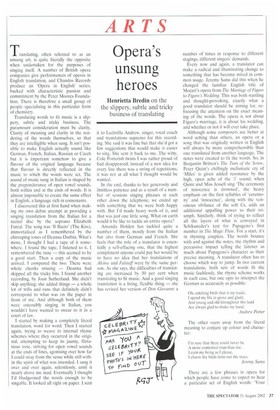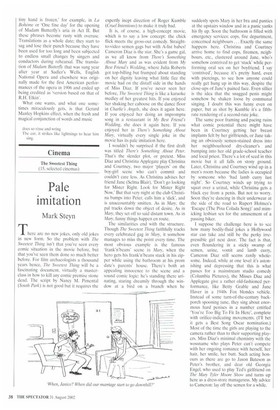Opera's unsung heroes
Henrietta Bredin on the the slippery, subtle and tricky business of translating Translating, often referred to as an unsung art, is quite literally the opposite when undertaken for the purposes of singing itself. A number of British opera companies give performances of operas in English translation, and Chandos Records produce an 'Opera in English' series, backed with characteristic passion and commitment by the Peter Moores Foundation. There is therefore a small group of people specialising in this particular form of chemistry.
Translating words to fit music is a slippery, subtle and tricky business. The paramount consideration must be clarity. Clarity of meaning and clarity in the rendering of the words themselves, so that they are intelligible when sung. It isn't possible to make English actually sound like German. French, Italian, Russian or Czech but it is important somehow to give a flavour of the original language because that flavour is directly reflected in the music to which the words were set. The sound of music sung in Italian is shaped by the preponderance of open vowel sounds, both within and at the ends of words. It is almost impossible to create the same effect in English, a language rich in consonants.
I discovered this at first hand when making my own debut attempt at providing a singing translation from the Italian for a recital disc by the soprano Elizabeth Futral. The song was ql Bacio' (The Kiss), immortalised as I remembered by the chirruping tones of Deanna Durbin. What's more, I thought I had a tape of it somewhere. I found the tape, I listened to it, I remembered the tune — this seemed to be a good start. Then a copy of the music arrived. I compared the two. There were whole chunks missing — Deanna had skipped all the tricky bits. I found another recording, by Joan Sutherland. She didn't skip anything: she added things — a whole lot of trills and runs that definitely didn't correspond to what was on the paper in front of me. And although both of them were ostensibly singing in Italian, you wouldn't have wanted to swear to it in a court of law.
I started by making a completely literal translation, word for word. Then I started again, trying to weave in internal rhyme schemes where they occurred in the original, attempting to keep its jaunty, flirtatious tone, striving for open vowel sounds at the ends of lines, agonising over how far I could stray from the sense while still within the spirit of what was intended. I sang it over and over again, relentlessly, until it nearly drove me mad. Eventually I thought I'd bludgeoned the words enough to be singable. It looked all right on paper. I sent it to Ludmilla Andrew, singer, vocal coach and translations supremo for this recording. She said it was fine but that she'd got a few suggestions that would make it easier to sing. She sent it back to me. The witty, Cole Porterish twists I was rather proud of had disappeared; instead of a new idea for every line there was a string of repetitions; it was not at all what I thought would be wanted.
In the end, thanks to her generosity and limitless patience and as a result of a number of sessions singing phrases at each other down the telephone, we ended up with something that we were both happy with. But I'd made heavy work of it, and that was just one little song. What on earth would it be like to tackle an entire opera?
Amanda Holden has tackled quite a number of them, mostly from the Italian but also from German and French. She feels that the role of a translator is essentially a self-effacing one, that the highest compliment anyone could pay her would be to have no idea that her translations of Alcina and Falstaff were by the same person. As she says, the difficulties of translating are increased by 50 per cent when translating to fit music. And a good singing translation is a living, flexible thing — she has revised her version of Don Giovanni a number of times in response to different stagings. different singers' demands.
Every now and again, a translator can make a radical and illuminating change to something that has become mired in common usage. Jeremy Sams did this when he changed the familiar English title of Mozart's opera from The Marriage of Figaro to Figaro's Wedding. This was both startling and thought-provoking, exactly what a good translator should be aiming for, refocusing the attention on the exact meaning of the words. The opera is not about Figaro's marriage, it is about his wedding, and whether or not it will ever take place.
Although some composers are better at word setting than others, an opera or a song that was originally written in English will always be more comprehensible than one translated from another language. The notes were created to fit the words. So, in Benjamin Britten's The Turn of the Screw, Peter Quint's chillingly melismatic cry of 'Miles' is given added resonance by the high, open ache of the 'i' sound; when Quint and Miss Jessell sing `The ceremony of innocence is drowned', the heavy emphasis on the first syllables of 'ceremony' and Innocence', along with the venomous sibilance of the soft Cs, adds an additional appalling power to their triumph. Similarly, think of trying to reflect all the layers of what is conveyed in Schikaneder's text for Papageno's first number in The Magic Flute. For a start, it's in rhyming couplets. The words bounce with and against the notes, the rhythm and percussive impact telling the listener as much about Papageno's character as their precise meaning. A translator often has to choose which way to jump. In two current translations, both sets of words fit the music faultlessly, the rhyme scheme works in each case, but one opts to interpret the German as accurately as possible:
Oh, catching 'birds that is my trade; I spend my life in grove and glade.
And young and old throughout this land Are always glad to shake my hand.
Andrew Porter The other veers away from the literal meaning to conjure up colour and character:
I'm sure that there could never he
A more contented man than me.
I earn my living as I please.
I charm the birds from out the trees.
Jeremy Sams There are a few phrases in opera for which people have come to expect to hear a particular set of English words: 'Your tiny hand is frozen,' for example, in La Boheme or 'One fine day' for the opening of Madam Butterfly's aria in Act H. But these phrases become rusty with overuse. Translations as a whole date; they start to sag and lose their punch because they have been used for too long and been subjected to endless small changes by singers and conductors during rehearsal. The translation of Madam Butterfly that was sung year after year at Sadler's Wells, English National Opera and elsewhere was originally made for the first American performances of the opera in 1906 and ended up being credited as 'version based on that of R.H. Elkin'.
What one wants, and what one sometimes miraculously gets, is that Gerard Manley Hopkins effect, when the fresh and magical conjunction of words and music
does so rinse and wring The ear, it strikes like lightnings to hear him sing.



























































 Previous page
Previous page